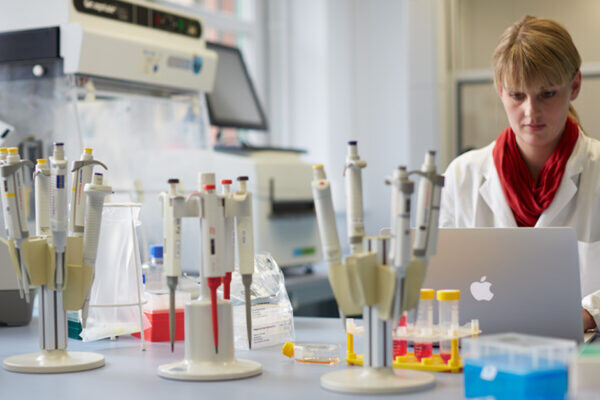- Labforward
- Blog
- Lab 4.0: The Emerging Opportunities for R&D in the Digital Age
March 1, 2022

The widespread implementation of disruptive technologies in the laboratory environment heralds a new era for how research is planned, executed, documented and distributed. It marks a move from traditional approaches to research, to more modern ones that can increase research throughput, which, in turn will help us develop groundbreaking technology and discover more about the world around us. Throughout history, technological progression and scientific advancement have gone hand in hand and today laboratory 4.0 strategies offer researchers the tools to maximize time and effort, increasing productivity, compliance and collaboration in the laboratory. This blog delves into why researchers should start the digitalization process, what can be gained and Labforward’s approach to Laboratory 4.0.
Why is digitization needed and what are the drawbacks of delay?
All researchers will know that the laboratory can be a complex and stressful environment to work in. Because of this there is an increased need for seamless documentation, digitally accurate account and task management and standardized data storage and processing systems. For many years now, products that alleviate the struggles of scientists have been on the market. Take the Electronic lab notebook for instance. A researcher can unify their documentation and make the most of built in features that encourage standardization, compliance and collaboration. Similarly a laboratory’s materials can now be monitored and accounted for by an inventory management system. In short, digitization offers opportunities to streamline the daily tasks of the scientist and there are plenty of options available that fit specific research requirements, so why not take advantage of this software early. If Laboratory 4.0 is the inevitable future, then why delay its implementation?
Whilst some laboratories were quick to start the process, others, particularly academic labs, lag behind in terms of digital progression. This is caused by a number of factors, however it is often attributed to the differences in funding- whereas academic laboratories often rely on grants, industry in comparison typically has the capacity to implement widespread changes to improve productivity. Yet given the edge that those with digital tools have, it is becoming increasingly important to start the digitization journey. In a world dominated by fierce competition, having an organized, unified and digitized system for planning, executing and recording research has substantial benefits.
Laboratory 4.0 strategies
Having documentation software and an inventory management system, is just the tip of the iceberg. When paired with internet of things (IoT) technology, it is possible for researchers to automate their laboratory infrastructure and control their devices, software systems, processes and databases. This essentially means that researchers are able to monitor every aspect of an experiment from inception to conclusion making resource management and team collaboration not only simpler, but also safer, more compliant and efficient.

With connected receptors that constantly monitor temperature, movement and other environmental conditions, it is possible for a scientist to be able to conduct an experiment without actually being present in the laboratory. This will allow both greater flexibility and standardization as experiments can be performed at the optimal time, rather than a time that fits into a scientist’s busy schedule and all workflows will be strictly followed and documented.
It is also worth noting that the laboratory is characterized by a mix of heterogeneous equipment of different suppliers, a laboratory could be composed of an Eppendorf centrifuge, a ThermoScientific NanoDrop, a BioRad PCR machine or a Tecan Plate reader. The equipment will also likely differ in age, some being new whilst other equipment can be 20-30 years old. Given the nature of this varied environment, particularly in areas where no automation systems are used, a high degree of flexibility is required from the solution selected in order to be able to respond, for example, to a short-term change in the order situation or a modified procedure for analysis or synthesis.
Considering the above observations, four overriding requirements for an IoT solution in the laboratory become especially important.
- The solution must be able to work with a large variety of laboratory equipment, and be compatible with a large majority, if not all suppliers.
- The solution must take into account different types of integration.
- The solution must function as a “retrofit” solution, it must be compatible with old systems and equipment.
- The solution must be flexibly adaptable or expandable.
Labforward’s approach to Laboratory 4.0
Labforward solutions provide the foundations for laboratory 4.0. Our strategy is to develop a unified platform that can be used to guide a researcher through every step of an experiment, increasing research throughput, collaboration whilst facilitating standardization and compliance. From the planning stage, through to workflow execution, to the documentation of the experiment. As of today, we have three products that enable this: Labfolder, Laboperator and Labregister:

The Labfolder is an intuitive and powerful electronic lab notebook (ELN) that can streamline life in the lab by simplifying data documentation. Scientists can record and store their research on a central platform accessible from anywhere and benefit from extensive features that facilitate collaboration, compliance and the standardization of common procedures in the lab.
The Labregister is an effective and comprehensive laboratory inventory management system (LIMS) that facilitates oversight of a lab’s entire inventory. Researchers can list materials with their properties to ensure a central organization. The system allows scientists to follow each inventory item through its specific lifecycle and enables a direct connection to laboratory notes.
The Laboperator is a smart and agile laboratory execution system (LES) that connects laboratory equipment to a central platform, enabling scientists to automate and monitor existing laboratory devices. With this system, researchers can manage their laboratory remotely, whilst collecting and analyzing instrument data in real-time, significantly improving productivity and precision of research.
Advances in technology and software should not be undermined. Alongside our partners, we are pioneering new ways to revolutionize research and development, improving experiment execution and documentation. Labforward’s laboratory 4.0 approach offers a flexible, agile way of conducting R&D and can be adapted to suit any form of scientific research facilitating greater connections within the laboratory.
What comes next?
Further down the line, AI and machine learning will likely become the focus of laboratory 4.0. Its adoption will likely take the form of an advisory system, working in conjunction with automation to predict outcomes and construct the best possible courses of action within research projects. For example, AI could assess all variables and predict which temperature or material would have the desired impact, saving the researcher from trying out numerous possibilities and wasting valuable and expensive chemicals. In addition to this, the nature of machine learning is its ability to learn and recollect pieces of information and successfully apply that knowledge to devise the best possible strategy, essentially it gets smarter with every use.
As digitalization continues to substantially improve the way research is conducted, from the planning stage to production, the pressure is on for laboratories to get to an appropriate level of technological sophistication in order to maximize the opportunities the digital world creates.

